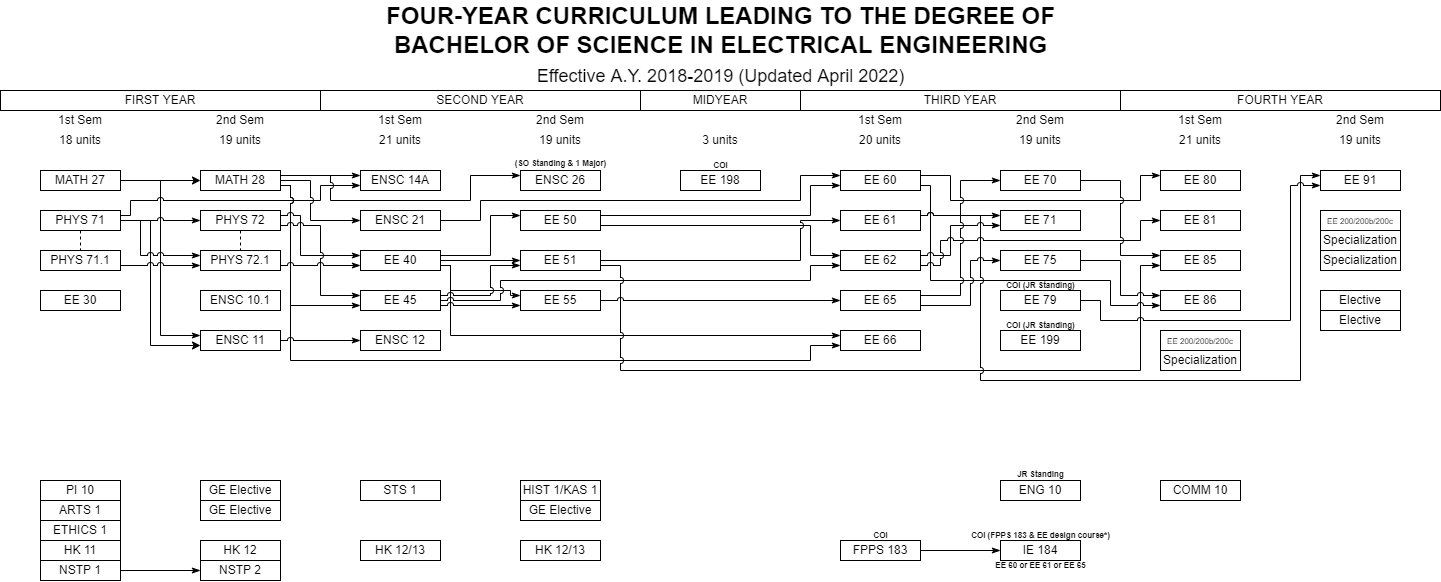4-Yr Curriculum
Flowchart

Course Descriptions
EE 1. Basic Electrical Engineering (3). Network laws and theorems; resistive and alternative current circuits; basic electronics; power transformers; introduction to logic circuits and motors. 5 hrs (2 class, 3 lab). PR. MATH 27. (1,2)
EE 30. Introduction to Electrical Engineering (1). Nature and scope of electrical engineering. 1 hr (class). PR. None. (1)
EE 40. Fundamentals of Electrical Engineering I (4). Direct-current resistive circuit concepts, laws, circuit analysis and techniques. 6 hrs (3 class, 3 lab). PHYS 72 and PHYS 72.1. (1,2)
EE 45. Fundamentals of Engineering Electromagnetics (3). Vector Analysis; steady electric and magnetic fields; dielectric and magnetic materials; time-varying fields; Maxwell’s equations; applications to electrical engineering. 3 hrs (class). PR. PHYS 72 and MATH 28. (1,2)
EE 50. Fundamentals of Electrical Engineering II (4). Transient response; sinusoidal steady state; resonance; polyphase systems. 6 hrs (3 class, 3 lab). PR. EE40. (1,2)
EE 51. Electromechanical Energy Conversion for DC (3). Basic principles of electromechanical energy conversion; generalized machine model; performance characteristics of direct-current, synchronous and induction machines. 5 hrs (2 class, 3 lab). PR. EE40 and EE 45. (1,2)
EE 55. Semiconductor Devices (3). Modeling of PN-junctions and characteristics of
semiconductor devices. 5 hrs (2 class, 3 comp). PR. EE 40 and EE 45 (1,2)
EE 60. Signals and Systems (3). Principles, operations, and analysis of continuous- and discrete-time signals and systems. 5 hrs (2 class, 3 lab). PR. EE 50 and ENSC 21. (1,2)
EE 61. Electromechanical Energy Conversion for AC (4). Engineering aspects, performance characteristics, and applications of alternators, AC motors, and transformers. 6 hrs (3 class, 3 lab). PR. EE 51. (1,2)
EE 62. Principles of Power Systems (3). Power systems theories; economics of power system; protection and grounding. 3 hrs (class). PR. EE 45 and EE 50. (1,2)
EE 65. Electronic Circuits (4). Applications of semiconductor devices, and operational amplifier circuits. 6 hrs (3 class, 3 lab). PR. EE 55. (1,2)
EE 66. Signals and Noise in Electrical Engineering Networks (3). Analysis of signals and noise in communication systems and other electric networks. 3 hrs (class). PR. EE 40 and MATH 28. (1,2)
EE 70. Instrumentation Engineering (4). Basic electrical instrumentation and measurement; sensing elements and circuits; programmable logic controllers. 6 hrs (3 class, 3 lab). PR. EE 65. (1,2)
EE 71. Analysis of Power Systems (3). Modelling of electric power systems and implementation of load flow studies and fault calculations. 3 hrs (class). PR. EE 61 and EE 62. (1,2)
EE 75. Digital Electronics (4). Digital numbering systems and codes; logic concepts and gates; Boolean algebra; combinational and sequential logic circuits; binary arithmetic operations; integrated circuit families; analog-to-digital and digital-to-analog conversion; digital measurements. 6 hrs (3 class, 3 lab). PR. EE 65. (1,2)
EE 79. Electrical Engineering Law, Ethics and Contracts (1). Laws, ethics, and contracts governing the electrical engineering profession. 1 hr (class). PR. COI (Junior Standing). (2)
EE 80. Control Systems Analysis (3). Continuous –time and feedback control system analysis, design, and stability. 3 hrs (class). PR. EE 60. (1,2)
EE 81. Maintenance of Electrical Equipment and Devices (3). Testing procedures and standards for evaluation of test results for electrical preventive maintenance. 5 hrs (2 class, 3 lab). PR. EE 62. (1,2)
EE 85. Industrial Electronics (3). Automation, phase control and power circuits for industrial applications. 5 hrs (2 class, 3 lab). PR. EE 51 and EE 70. (1,2)
EE 86. Electronic Communication Systems I (3). Basic concepts on the transmission and reception of signals in electronic communication systems. 3 hrs (class). PR. EE 60 and EE 75. (1,2)
EE 91. Electrical System Design, Planning and Estimation (4). Formation of electrical plans and development of estimates and schedules for electrical engineering projects. 6 hrs (3 class, 3 lab). PR. EE 61 and EE 79. (1,2)
EE 198. Internship (3). PR. COI. (1,2,M)
EE 199. Undergraduate Seminar (1). May be taken twice. 1 hr (class). PR. COI. (1,2)
EE 161. Electrical Machine Design (3). Design process for transformers, DC and AC machines based upon fundamental theories, ideas on future challenges for machine design, principles of the basic machine types including synchronous and induction. 3 hrs (class). PR. EE 51. (1)
EE 162. Reliability of Power Systems (3). Modeling and evaluation of the reliability of generation systems, interconnected power systems, and distribution systems. 5 hrs (2 class, 3 lab). PR. EE 71. (1,2)
EE 163. Industrial Power Systems (3). Principles and operations of industrial power systems, codes and recommended design practices. 5 hrs (2 class, 3 lab). PR. EE 71. (2)
EE 200*. Undergraduate Thesis (6). PR. COI. (1,2,M)
EE 200b*. Innovationeering (6). PR. COI. (1,2,M)
EE 200c*. Engineering Industry Research (6). PR. COI. (1,2,M)
*choose one only
EE 177. Power Electronics (3). Switching converter principles, phase control circuits, rectifiers, DC-DC and DC-AC converters. 5 hrs (2 class, 3 lab). PR. EE 85. (2)
EE 186. Electronic Communication Systems II (3). Radiowave propagation, components, and methods used in the analysis and design of electronic communication systems. 5 hrs (2 class, 3 lab). PR. EE 86. (2)
EE 188. Introduction to Mechatronics and Robotics (3). Mechatronics and robotic control in industrial automation. 5 hrs (2 class, 3 lab). PR. EE 28 or EE 80 (1, 2)
EE 200*. Undergraduate Thesis (6). PR. COI. (1,2,M)
EE 200b*. Innovationeering (6). PR. COI. (1,2,M)
EE 200c*. Engineering Industry Research (6). PR. COI. (1,2,M)
*choose one only
EE 175. Digital Logic and Hardware Description (3). Digital hardware description methods and applications. 5 hrs (2 class, 3 lab). PR. EE 75. (1,2)
EE 176. Microprocessor-Based Design (4). Microprocessor organizations and programming; microcomputer development systems and interfacing techniques. 6 hrs (3 class, 3 lab). PR. EE 70 and EE 80. (2)
EE 187. Digital Signal Processing (3). Digital signal principles, operations, and analysis. 5 hrs (2 class, 3 lab). PR. EE 60 and EE 66. (2)
EE 200*. Undergraduate Thesis (6). PR. COI. (1,2,M)
EE 200b*. Innovationeering (6). PR. COI. (1,2,M)
EE 200c*. Engineering Industry Research (6). PR. COI. (1,2,M)
*choose one only
